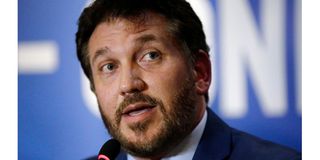Fifa vice president’s remarks on equal pay sparks outrage

International Federation of Association Football Vice President Alejandro Dominguez.
What you need to know:
- The push for gender equality is featured prominently at the ongoing Women's World Cup.
- UN Women and Fifa have come together to advance gender equality in football, and help end abuse and discrimination on and off the pitch.
International Federation of Association Football (Fifa) Vice President Alejandro Dominguez has kicked up a storm at the ongoing Women’s World Cup over his remarks that he does not believe in gender equal pay.
He was addressing a press conference in Sydney, one of the host cities. The World Cup is being held in Australia and New Zealand. It started on July 20 and will end on August 20, 2023.
“I don't believe in ‘equal pay’. I believe that everything has a ceiling and I think I don't know the ceiling of women's football,” he began.
“No one showed us what the ceiling of women's football is. So, let's work and see how far we get, because who knows if maybe one day women's soccer isn't suddenly better paid than men's soccer,” Mr Dominguez is reported to have told reporters.
Human rights organisations and gender activists have protested at the remark, terming it Fifa’s discrimination against women players and their rights when it comes to pay.
Mustafa Qadri, the CEO of Equidem, a human rights organisation, said even as Fifa voiced support for pay equity for women players, the commentary from its senior officials demonstrates its discrimination against women players and their rights when it comes to pay.
Also read: Mend the gender pay gap
“The issue of discrimination is not only with the players, but also the women who make Fifa merchandise. The multibillion-dollar sporting body is massively missing the mark. The working conditions faced by women in supply chains sourcing official Fifa merchandise – sexual harassment, being verbally abused and mistreated because they are women – are in clear violation of the values of dignity and respect that women players have made a defining feature of the 2023 FIFA Women’s World Cup,” said Mr Qadri.
Growth
Women’s football has relished unprecedented growth in recent years, with this year’s World Cup viewed as a valuable symbol of its evolution on the global stage. A historic 32 teams are in this year’s tournament, competing for a record $150 million plus purse, a package three times larger than that of 2019.
Although the package represents a 300 per cent increase from the 2019 edition of the Women's World Cup in France, it is just a third of the $440 million prize pot at the men’s World Cup in Qatar last winter.
The remarks by the vice president comes even as the push for gender equality is featured prominently at the competition. UN Women and Fifa have come together to advance gender equality in football, and help end abuse and discrimination on and off the pitch.
Globally, women players continue to struggle with fewer professional opportunities, a massive pay gap, fewer sponsorships, less airtime, and unequal playing conditions.
To address some of these challenges and close the gender gap, Fifa recently launched a campaign dubbed Football Unites the World campaign to highlight major gender equality issues during the global tournament.
The campaign will shine a spotlight on a range of social causes, selected following extensive consultations with participating players and their teams. It has come up with eight specific messages to be sent during the final tournament, with messages including ‘Unite for Inclusion’ and ‘Unite for Indigenous Peoples’ in collaboration with UN Human Rights.
There is also ‘Unite for Gender Equality’ in partnership with UN Women, ‘Unite for Peace’ in conjunction with UNHCR, and ‘Unite for Education for All’ in partnership with the UN Educational, Scientific and Cultural Organization (Unesco).
Other key messages include ‘Unite for Zero Hunger’ in support of the UN World Food Programme and ‘Unite for Ending Violence Against Women’ in partnership with UN Women.
The World Health Organization (WHO) and Fifa also have another message: ‘Football is Joy, Peace, Love, and Hope & Passion’.
To further entrench gender equality in global football, Fifa has raised the prize money for the 2023 Women’s World Cup to $150 million-triple the amount in 2019 as part of a three-step gender equality plan.
The equal pay debate has been in the spotlight for some time now, more so since the US national team achieved the feat last year.
After suing their federation in 2019 on the grounds of 'gender discrimination', the players began a long and arduous fight to get equal compensation with the men's team, something they accomplished four years later when a labour agreement was reached, stating that men and women would receive equal World Cup prize money pay.





